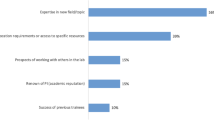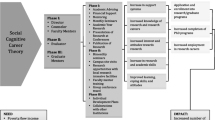Abstract
The research described here comprised a pilot study that attempted to identify the factors in decisions of highly capable students from underrepresented minority groups to forego study for science or engineering doctorates. Underrepresented students are defined as Blacks, Hispanics, and Indians. While these groups will soon comprise 30% or more of the population, they receive only 5% of the S & E (Science and Engineering) doctorates. The research was completed under NSF (National Science Foundation) grant no. REC 9908861. The research built on a previous NSF study (RED-9355867) that identified the most effective colleges and universities in the country in the preparation of Black, Hispanic, and Indian science and engineering students for study toward the PhD degree. One of the major concerns raised during the site visits to the top 10 institutions serving these groups was the loss of capable students to other careers. The study obtained information from minority graduates about factors impacting persistence to graduate studies in science and engineering and solicited suggestions for attracting more people like themselves to S & E doctoral study. Twelve underrepresented minority S & E graduates who decided to forego doctoral study in favor of other pursuits. Themes emerging from these conversations regarding reluctance to pursue advanced study included the following: concern for ability to finance such study; weaknesses in advisement practices and systems; lack of full knowledge, early on, about the rewards of doctoral employment; and concern about opportunities for employment after graduation. Suggestions proffered for attracting more underrepresented minorities to S & E doctoral study included the following: early socialization of youngsters into the world of science and its practice; expanded funding for scholarships and fellowships; expanded outreach by colleges and universities; expanded efforts by churches and community groups and deeper commitments by colleges and universities.
Similar content being viewed by others
REFERENCES
Allison, G. T. (1971). Essence of Decision, Little, Brown and Company, Boston.
Blau, P. M., Gustad, J. W., Jesser, R., Parnes, H. S., and Jesser, R. Elements of decision theory. Industrial Relations Review 9: 531–543.
Bazerman, M. H. (1990). Judgement, in Managerial Decision Making, Wiley, New York.
Brazziel, W. F., and Brazziel, M. E. (1992). Science and Engineering Doctorate Production Among Minorities with Non-Traditional Backgrounds, Report of Research Grant No. SED-9107756, National Science Foundation.
Brazziel, W. F., and Brazziel, M. E. (1995). Distinctiues of High Producers of Minoritu Science and Engineering Doctoral Starts, Report of Research Grant No. RED-9355867, National Science Foundation.
Brazziel, W. F. (1964). Workers' Decisions to Retrain, Research Monograph No. 200, U.S. Department of Labor.
Cirasa-Parish, A. M. (1991). Planning Considerations Accorded Corporate Courses Designed for College Credit, Doctoral Dissertation, University of Connecticut.
Cook, R.W., and Zalloco, R. L. (1983). Predicting university preference and attendance. Research in Higher Education 19: 197–211.
Davis, D. (1997). The directive of race of interview effects among African Americans. American Journal of Political Science 41: 309–322.
Demis, R. (1996). Creating conversation: Reflections on cultural sensitivity in family interviewing. Journal of Applied Psychology 81: 178–186.
Drucker, P. (1974). Management: Tasks, Practices, Responsibilities, Harper & Row, New York.
Glazer, B., and Strauss, A. (1969). The Discovery of Grounded Theory: Strategies for Qualitative Research, Aldine, Chicago.
Hamilton, D. A. (1995). Interviewing procedures for validating science assessments. Measurement in Education 10: 181–200.
Hardi, B. (1999). Graduate Enrollment in Science and Engineering Continued to Decline in 1998, National Science Foundation Data Brief No. 00-307.
Hodgkinson, H. F. (1994). How We Are Changing, Center for Demographic Policy, Washington, DC.
Holstein, *7. (1995). The Active Interview, Sage, New York.
Hossler, D., and Gallagher, K. (1987). Studying college choice. College and University 62: 207–221.
Hudson Institute. (1987). Workforce 2000, Indianapolis, IN.
Kador, J. (1997). Ask the right questions. Datamation 43: 59–62.
Kerlinger, F. N. (1973). Foundations of Behavioral Research, Holt, Rhinehart and Winston, New York.
Kuh, G. (1998). Involving Colleges, Jossey-Bass, San Francisco.
Levine, A. (1976). Educational and occupational choice: A synthesis of literature from Sociology and Psychology. Journal of Consumer Research 2: 276–289.
McDonough, P. (1997). Choosing Colleges, State University of New York Press, New York.
McGarry, M. (1992). Decision Factors Related to Dual Accreditation of Nursing Programs, Doctoral Dissertation, University of Connecticut.
Mencucci, J. (1996). Mentoring of Women Science and Engineering Doctoral Students, Doctoral Dissertation, University of Connecticut.
Milam, J. F. (1990). Overcoming barriers to college attendance. UCLA Journal of Education 29: 39–53.
National Science Foundation. (1999). Doctorate Recipients From United States Universities: Summary Report 1998.
Petersen, P., and Ivey, A. (1993). Culture Centered Counseling and Interviewing Skills, Praeger Press, Westport, CT.
Prewitt, L. (1996). Effects of race on interview ratings. Journal of Applied Psychology 81: 178–186.
Sheppard, S. L., and Carrger, E. (1995). Commentary on student interviews. Innovation in Higher Education 20: 271–276.
Steinbrunner, W. (1974). The Cybernetic Theory of Decision, Princeton University Press, Princeton, NJ.
Sivula, M. (1991). Factors in Doctorate Recipients Decisions to Forego Careers in College Teaching, Doctoral Dissertation, University of Connecticut.
Tsapogos, J. (1996). Incidence of and Factors Related to Progression to Graduate School Among Recent Science and Engineering Baccalaureate Recipients, Paper Presented at the 1996 Association for Institutional Research Conference.
Weiss, R. (1994). Learning From Strangers, Free Press, New York.
Author information
Authors and Affiliations
Rights and permissions
About this article
Cite this article
Brazziel, M.E., Brazziel, W.F. Factors in Decisions of Underrepresented Minorities to Forego Science and Engineering Doctoral Study: A Pilot Study. Journal of Science Education and Technology 10, 273–281 (2001). https://doi.org/10.1023/A:1016694701704
Issue Date:
DOI: https://doi.org/10.1023/A:1016694701704




